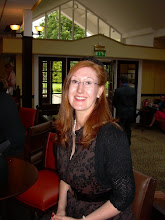 My final call at the book festival was the Tennyson Research Centre. We were treated to a short talk on its holdings, and it’s amazing what’s there – a piano which may have belonged to Emily Tennyson, the majority of the Tennyson library (his father’s, his wife’s, his own), and some surprising memorabilia. Grace Timmins, who gave the talk, made it clear that any collection of Tennysonia (a real word?) is self-conscious, since even before he died people were hanging onto anything that might possibly have been connected with him, as he was such a celebrity (and not a fake tan in sight…) I suppose this is how they come to have two small pairs of scissors labelled "The Poet’s Scissors", which amused me, as well as numerous pipes and quills (enough DNA to recreate him?)
My final call at the book festival was the Tennyson Research Centre. We were treated to a short talk on its holdings, and it’s amazing what’s there – a piano which may have belonged to Emily Tennyson, the majority of the Tennyson library (his father’s, his wife’s, his own), and some surprising memorabilia. Grace Timmins, who gave the talk, made it clear that any collection of Tennysonia (a real word?) is self-conscious, since even before he died people were hanging onto anything that might possibly have been connected with him, as he was such a celebrity (and not a fake tan in sight…) I suppose this is how they come to have two small pairs of scissors labelled "The Poet’s Scissors", which amused me, as well as numerous pipes and quills (enough DNA to recreate him?)The insight into Tennyson's father (alcoholic, unstable, rather mad vicar, extremely educated) impacts upon one's understanding of the poet; and Tennyson scholars are fascinated by the books he had access to in his father's library. It's also amusing to think of this mad, clever man giving impenetrable, erudite sermons to Lincolnshire peasants who probably didn't understand a word of it. There's also what could be considered to be Tennyson's first work - his translations of Horace, and some fascinating marginalia - doodles, genealogies of the Greek gods, and some workings out of the number of ships that were sent to rescue Helen of Troy!
It's sad that the library of the remarkably intelligent and educated Emily Tennyson consists largely of religious books and novels, but of course she would have had access to her husband's library and read much more widely than this. Tennyson's own library is, it appears, rather selective - the Research Centre owns far more than they display, and despite the poet being a well-known voracious reader of novels, it's the more serious works that are on display. Of course when space is limited choices must be made, but this does seem a rather fascist way of editing his 'legacy'! - it's quite comforting to know that Tennyson indulged in the Victorian equivalent of EastEnders!
His family life, with 10 siblings, seems chaotic and dream-like, reminiscent of the Brontes. I love the vision of his mother being pulled around in a cart drawn by a Newfoundland mastiff, pausing unpredictably while the children recited poetry; and of the young Tennyson taming an owl to sit on his mother's shoulder, which is lovely until it fights with the monkey... When three of the Tennyson brothers had their first volume of poetry published, they hired a coach to take them to Mablethorpe to shout their joy to the world! People just don't seem so interesting today, sadly.
The Centre has many editions of Tennyson's work, though few manuscripts (most are at Trinity College Cambridge or in the States), but they do have a ms of 'In Memoriam', which is so valuable it's kept in a safe, and I was disappointed that we didn't get to see it. We did get to see multiple proofs of 'The Charge of the Light Brigade', though, and it's amazing how many times he changed his mind about where in the poem the famous "Half a league..." stanza should appear. One almost pities his publishers. In fact he was rather careless with his manuscripts, since he had excellent recall. Apparently he once asked Coventry Patmore to look for something he had written, and it was found in the grocery box, written in the butcher's book. He also had an uneasy relationship with illustrators, only liking Julia Margaret Cameron. The Centre has a 6th edition of The Princess, illustrated by Maclise, with a comment in Tennyson's writing next to an illustration which simply reads "Wrong!" I was intrigued by an 1866 edition of his poems with a remarkable, intricate fore-edge painting which shows Farringford when bent one way, and Somersby the other.
There are also some excellent letters to view, including comically illustrated correspondence between Emily and Edward Lear, and a sincere letter of condolence from Queen Victoria on the death of his son, Lionel, not to mention an autograph-seeking letter from Prince Albert! This archive provides a wonderful insight into the ways of Victorian celebrity! There is also an unsent letter to the soldiers in Sebastopol, who (rather surprisingly) had asked for copies of 'The Charge of the Light Brigade'. Tennyson sent 1000 copies, and wrote them a letter talking patriotically of the glory of the soldiers - but there's a little note on it by Emily suggesting that "while it might be pleasant to write to soldiers, one is afraid to seem too regal"!! I could go on, as there was so much to see and so many anecdotes told to us, but the most important thing is that I now have a strong desire to reread Tennyson and to think about his poetry and not just the physical things he left behind.










